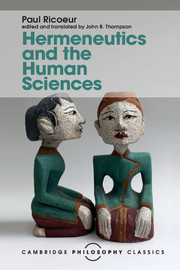Book contents
- Frontmatter
- Contents
- Preface to this edition
- Acknowledgements
- Editor's introduction
- Notes on editing and translating
- A response by Paul Ricoeur
- Part I Studies in the history of hermeneutics
- 1 The task of hermeneutics
- 2 Hermeneutics and the critique of ideology
- 3 Phenomenology and hermeneutics
- Part II Studies in the theory of interpretation
- Part III Studies in the philosophy of social science
- Select bibliography
- Index
1 - The task of hermeneutics
from Part I - Studies in the history of hermeneutics
Published online by Cambridge University Press: 05 July 2016
- Frontmatter
- Contents
- Preface to this edition
- Acknowledgements
- Editor's introduction
- Notes on editing and translating
- A response by Paul Ricoeur
- Part I Studies in the history of hermeneutics
- 1 The task of hermeneutics
- 2 Hermeneutics and the critique of ideology
- 3 Phenomenology and hermeneutics
- Part II Studies in the theory of interpretation
- Part III Studies in the philosophy of social science
- Select bibliography
- Index
Summary
This essay seeks to describe the state of the hermeneutical problem, such as I receive and perceive it, before offering my own contribution to the debate. In this preliminary discussion, I shall restrict myself to identifying not only the elements of a conviction, but the terms of an unresolved problem. For I wish to lead hermeneutical reflection to the point where it calls, by an internal aporia, for an important reorientation which will enable it to enter seriously into discussion with the sciences of the text, from semiology to exegesis.
I shall adopt the following working definition of hermeneutics: hermeneutics is the theory of the operations of understanding in their relation to the interpretation of texts. So the key idea will be the realisation of discourse as a text; and the elaboration of the categories of the text will be the concern of a subsequent study. The way will thereby be prepared for an attempt to resolve the central problem of hermeneutics presented at the end of this essay: namely the opposition, disastrous in my view, between explanation and understanding. The search for a complementarity between these two attitudes, which Romantic hermeneutics tends to dissociate, will thus express on the epistemological plane the hermeneutical reorientation demanded by the notion of the text.
From regional hermeneutics to general hermeneutics
The appraisal of hermeneutics which I propose converges towards the formulation of an aporia, which is the very aporia that has instigated my own research. The presentation which follows is therefore not neutral, in the sense of being free from presuppositions. Indeed, hermeneutics itself puts us on guard against the illusion or pretension of neutrality.
I see the recent history of hermeneutics dominated by two preoccupations. The first tends progressively to enlarge the aim of hermeneutics, in such a way that all regional hermeneutics are incorporated into one general hermeneutics. But this movement of deregionalisation cannot be pressed to the end unless at the same time the properly epistemological concerns of hermeneutics – its efforts to achieve a scientific status – are subordinated to ontological preoccupations, whereby understanding ceases to appear as a simple mode of knowing in order to become a way of being and a way of relating to beings and to being.
- Type
- Chapter
- Information
- Hermeneutics and the Human SciencesEssays on Language, Action and Interpretation, pp. 3 - 22Publisher: Cambridge University PressPrint publication year: 2016
- 3
- Cited by



